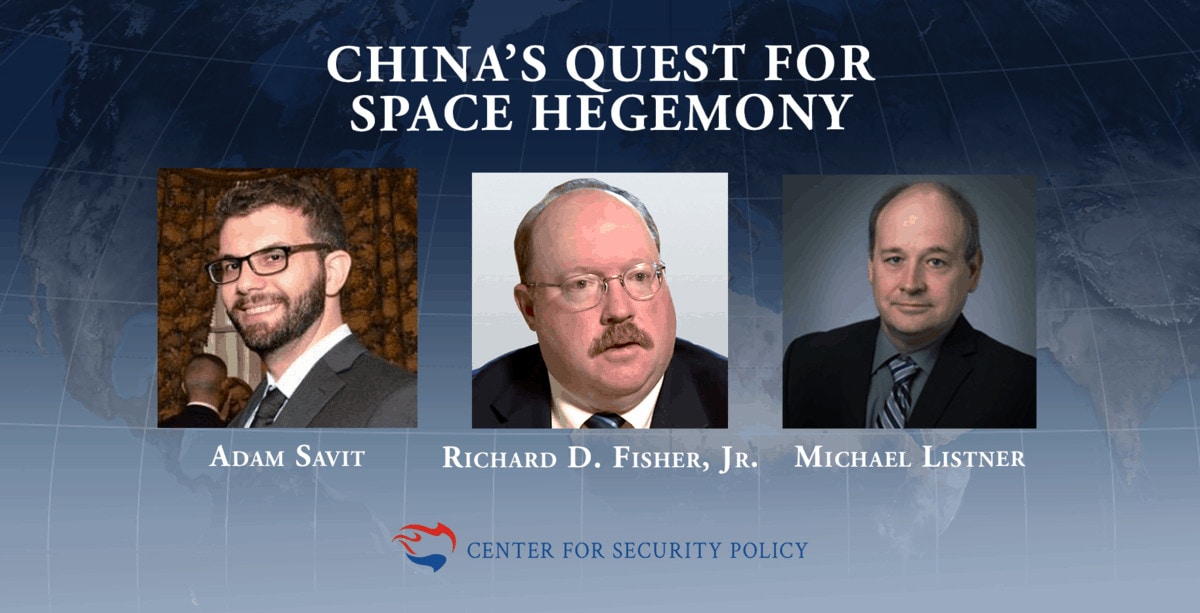Webinar: China’s Quest for Space Hegemony

The rise of an expansionist People’s Republic of China is broadly acknowledged to be the primary geopolitical threat facing the United States in the 21st century. Presented with a challenge so comprehensive across multiple layers and fronts, it is easy to overlook some vectors which fail to grab daily headlines but nonetheless develop steadily until their momentum shifts the strategic ground under our feet. Political suppression in Hong Kong, military encroachment upon Taiwan, territorial expansion in the South China Sea and genocide in Xinjiang are all vitally important. One topic that arguably receives short shrift in proportion to its strategic importance, is the emergence of a new “space race.”
On April 14, the Center for Security Policy’s China Program convened a webinar entitled “China’s Quest for Space Hegemony,” featuring two prominent experts in the field: Michael Listner, an attorney and the founder and principal of Space Law and Policy Solutions, a think tank and consultation firm that concentrates on legal and policy matters on outer space law and policy as it relates to national security, geopolitics, industry and development, and author of “The Précis,” a subscription quarterly briefing letter relating to outer space law, policy and geopolitics, and Rick Fisher, a Senior Fellow on Asian Military Affairs at the International Assessment and Strategy Center and a recognized authority on the People’s Republic of China military and the Asian military balance and their implications for Asia and the United States, having held critical positions in the field for over 20 years. His most recent book is China’s Military Modernization: Building for Regional and Global Reach.
How seriously does the Biden administration take space security? When questioned about apparent surprise in the media regarding Biden’s retention of the Trump-initiated U.S. Space Force (USSF), Michael Listner pointed out that “this is actually law now.” The president does not have the authority to arbitrarily dissolve it, rather the congress would have to “uncreate it” by law. He said that Trump took an evolutionary step in the right direction by declaring outer space a warfighting domain separate from traditional airspace, and therefore U.S. Air Force responsibility, as it had been for decades, but that the ultimate destiny of USSF lay in the hands of congressional funding priorities.
Satellites may be the most important and yet most vulnerable U.S. assets in space. Reportedly, China already has operational ground-based missiles that can hit satellites in low-Earth orbit and “probably intends to pursue additional anti-satellite weapons (ASAT) capable of destroying satellites up to geosynchronous Earth orbit.” Listner stated that U.S. countermeasures to ASAT weapons are classified, but that U.S. military officials profess confidence in their ability to defend satellites through resilience or “taking a punch and still getting up.” Listner warns that an unscrupulous enemy like China may take one big knockout punch by taking out all defenses or hitting key points that would preclude our recovery.
Rick Fisher concentrated heavily on the strategic importance of the moon, contending that “China requires control of the earth-moon system in order to really achieve its ambitions for political, military and economic hegemony on earth.” He sees the moon as the new high ground and the “ultimate satellite,” and critical to the development of a new “Space Economy.” The logistical key to China’s plans will be its Long March-9 super heavy-lift space launch vehicle (SLV) that can loft 140 tons to Low Earth Orbit (LEO) and perhaps over 200 tons with later versions. From 2030 onward a “Chinese blitz” to build 10 moon bases in the most desirable long-term habitats with ice water and other valuable resources would commence, allowing China to begin the business of producing oxygen, rocket fuel, and to start building new space infrastructure such as massive solar power gathering satellites.
When asked about a potential Chinese advantage in having a centralized command economy free from political constraints, both men expressed confidence in the abilities of the U.S. free market to excel. Fisher pointed to SpaceX and Blue Origin as exceptional laboratories for new technologies, with the Musk Starship promising to put hundreds of tons of cargo or passengers on the Moon or even Mars, noting that this one capability could catapult us ahead of China. Listner contended that “the die is cast,” and that commercial space is entrenched as the prime mover on the U.S. side, with the military outsourcing capabilities which were exclusive to government entities until recent years. He believes that “private is our secret weapon” and warns against excessive regulation.
A vigorous question and answer period included space/defense spending, use of nuclear weapons, nuclear powered space vehicles, international treaties, and how Russia plays into the new great power dynamics.
- Click here to view a video archive of the program
- Click here to read “In Space, China Seeks Galactic Hegemony,” an exclusive Center analysis by Rick Fisher.
- Click here to learn more about Michael Listner’s work
- Click here for a full archive of the Center’s webinar series
- Nearly half say coronavirus is man-made; 29% say it was intentionally released - February 17, 2022
- Americans back total boycott of Beijing Olympics under certain conditions - December 13, 2021
- Beijing pushes limits of authoritarian reach with latest celebrity “disappearance” - November 19, 2021
